Reflective Essay: Exploring Nursing Specialties and Career Paths
VerifiedAdded on 2023/04/06
|6
|1645
|470
Essay
AI Summary
This reflective essay, written by a nursing student, explores three key nursing specialties: neonatal nursing, medical-surgical nursing, and dialysis nursing. The essay begins with an introduction to the benefits of a nursing career and the importance of choosing a specialty based on personal strengths and interests. The student then delves into each specialty, describing the core responsibilities, personal interests, and challenges associated with each. The essay highlights the critical role of neonatal nurses in providing specialized care to newborns, the importance of medical-surgical nurses in supporting surgeons and providing post-surgery care, and the essential functions of dialysis nurses in monitoring, educating, and supporting patients with kidney disease. The student also reflects on personal experiences and the importance of continuous training and professional empowerment. The essay concludes with a discussion of coping strategies for graduate nurses transitioning into clinical practice, emphasizing the need for guidance, goal setting, and a supportive work environment.
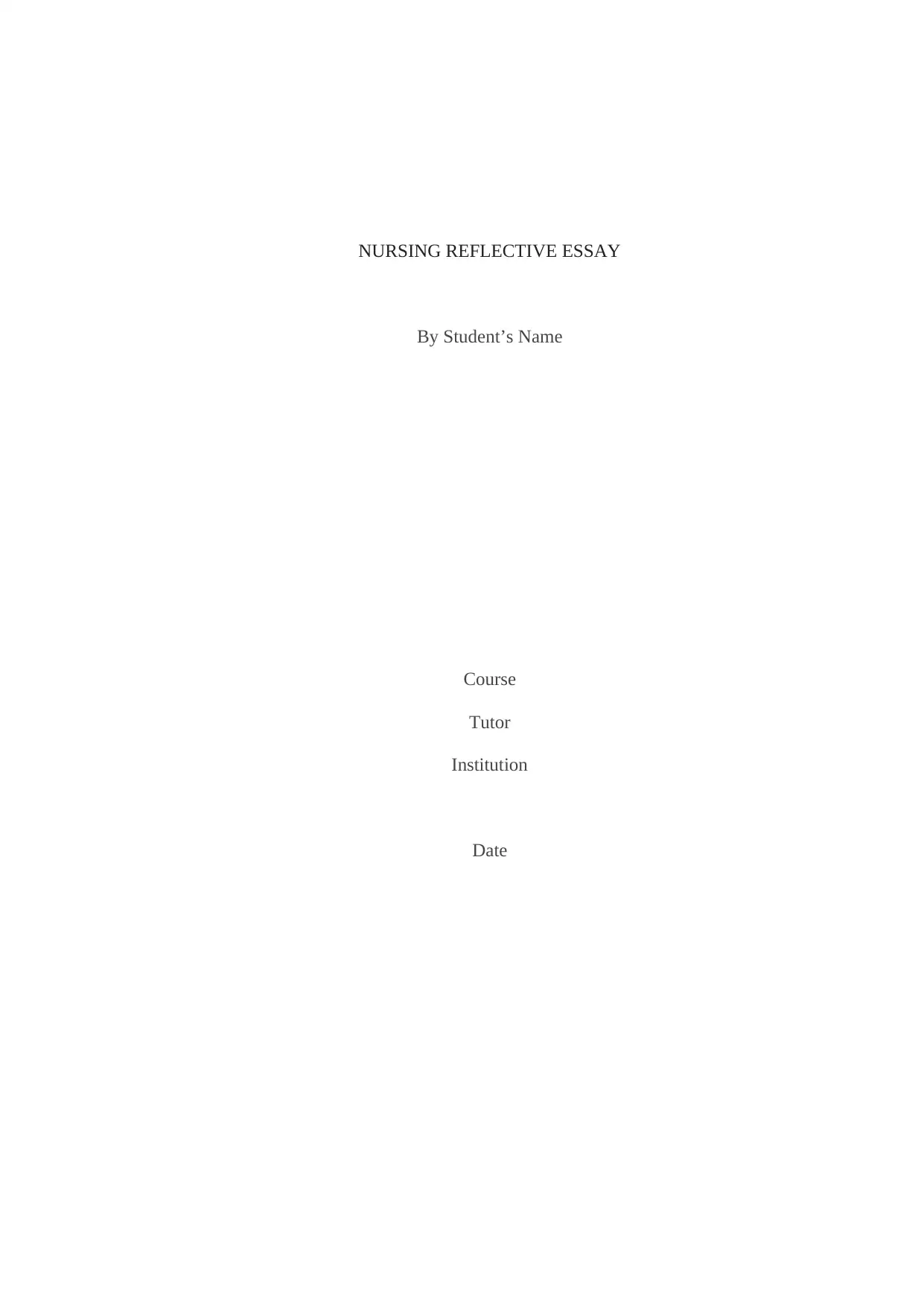
NURSING REFLECTIVE ESSAY
By Student’s Name
Course
Tutor
Institution
Date
By Student’s Name
Course
Tutor
Institution
Date
Paraphrase This Document
Need a fresh take? Get an instant paraphrase of this document with our AI Paraphraser
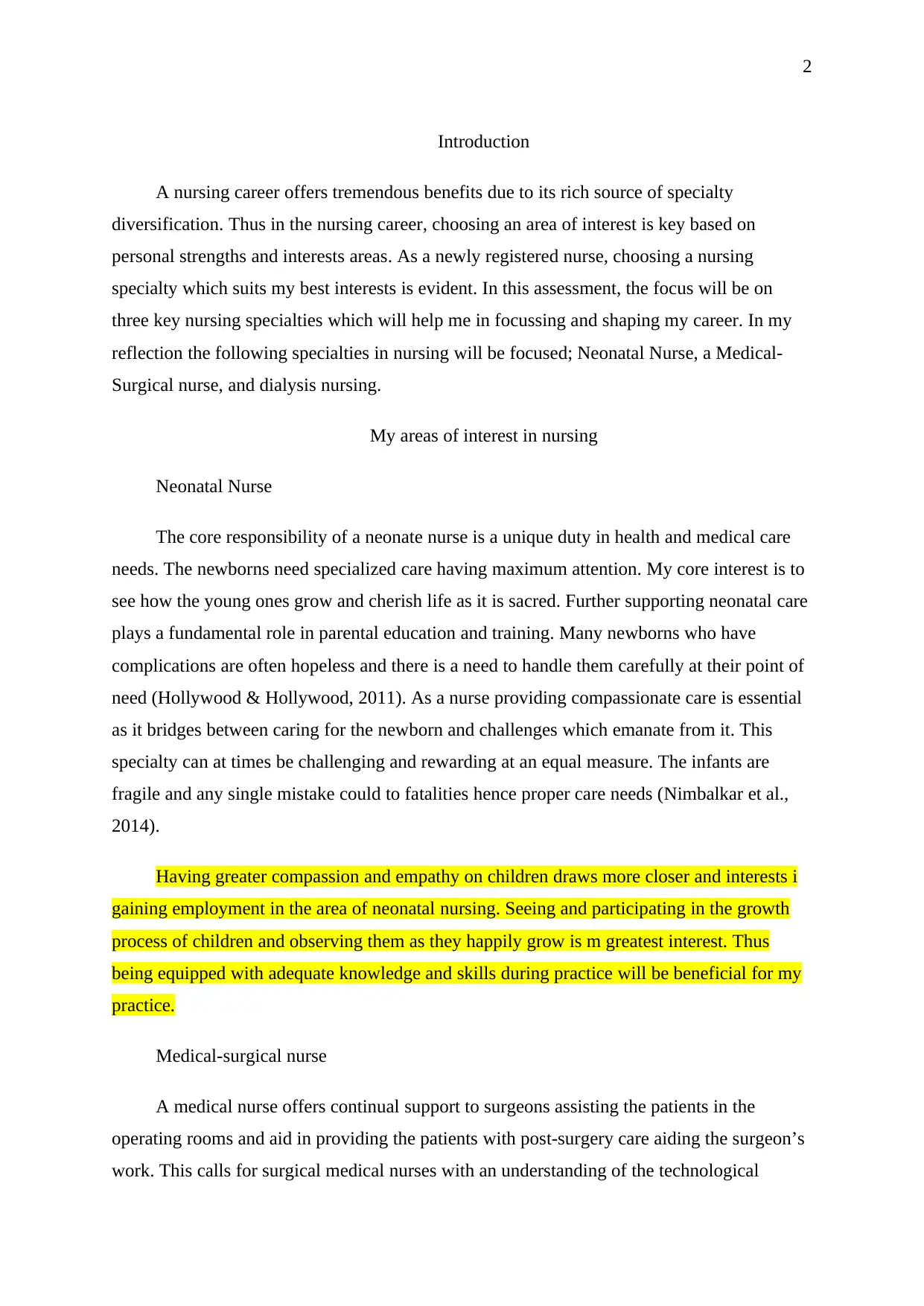
2
Introduction
A nursing career offers tremendous benefits due to its rich source of specialty
diversification. Thus in the nursing career, choosing an area of interest is key based on
personal strengths and interests areas. As a newly registered nurse, choosing a nursing
specialty which suits my best interests is evident. In this assessment, the focus will be on
three key nursing specialties which will help me in focussing and shaping my career. In my
reflection the following specialties in nursing will be focused; Neonatal Nurse, a Medical-
Surgical nurse, and dialysis nursing.
My areas of interest in nursing
Neonatal Nurse
The core responsibility of a neonate nurse is a unique duty in health and medical care
needs. The newborns need specialized care having maximum attention. My core interest is to
see how the young ones grow and cherish life as it is sacred. Further supporting neonatal care
plays a fundamental role in parental education and training. Many newborns who have
complications are often hopeless and there is a need to handle them carefully at their point of
need (Hollywood & Hollywood, 2011). As a nurse providing compassionate care is essential
as it bridges between caring for the newborn and challenges which emanate from it. This
specialty can at times be challenging and rewarding at an equal measure. The infants are
fragile and any single mistake could to fatalities hence proper care needs (Nimbalkar et al.,
2014).
Having greater compassion and empathy on children draws more closer and interests i
gaining employment in the area of neonatal nursing. Seeing and participating in the growth
process of children and observing them as they happily grow is m greatest interest. Thus
being equipped with adequate knowledge and skills during practice will be beneficial for my
practice.
Medical-surgical nurse
A medical nurse offers continual support to surgeons assisting the patients in the
operating rooms and aid in providing the patients with post-surgery care aiding the surgeon’s
work. This calls for surgical medical nurses with an understanding of the technological
Introduction
A nursing career offers tremendous benefits due to its rich source of specialty
diversification. Thus in the nursing career, choosing an area of interest is key based on
personal strengths and interests areas. As a newly registered nurse, choosing a nursing
specialty which suits my best interests is evident. In this assessment, the focus will be on
three key nursing specialties which will help me in focussing and shaping my career. In my
reflection the following specialties in nursing will be focused; Neonatal Nurse, a Medical-
Surgical nurse, and dialysis nursing.
My areas of interest in nursing
Neonatal Nurse
The core responsibility of a neonate nurse is a unique duty in health and medical care
needs. The newborns need specialized care having maximum attention. My core interest is to
see how the young ones grow and cherish life as it is sacred. Further supporting neonatal care
plays a fundamental role in parental education and training. Many newborns who have
complications are often hopeless and there is a need to handle them carefully at their point of
need (Hollywood & Hollywood, 2011). As a nurse providing compassionate care is essential
as it bridges between caring for the newborn and challenges which emanate from it. This
specialty can at times be challenging and rewarding at an equal measure. The infants are
fragile and any single mistake could to fatalities hence proper care needs (Nimbalkar et al.,
2014).
Having greater compassion and empathy on children draws more closer and interests i
gaining employment in the area of neonatal nursing. Seeing and participating in the growth
process of children and observing them as they happily grow is m greatest interest. Thus
being equipped with adequate knowledge and skills during practice will be beneficial for my
practice.
Medical-surgical nurse
A medical nurse offers continual support to surgeons assisting the patients in the
operating rooms and aid in providing the patients with post-surgery care aiding the surgeon’s
work. This calls for surgical medical nurses with an understanding of the technological
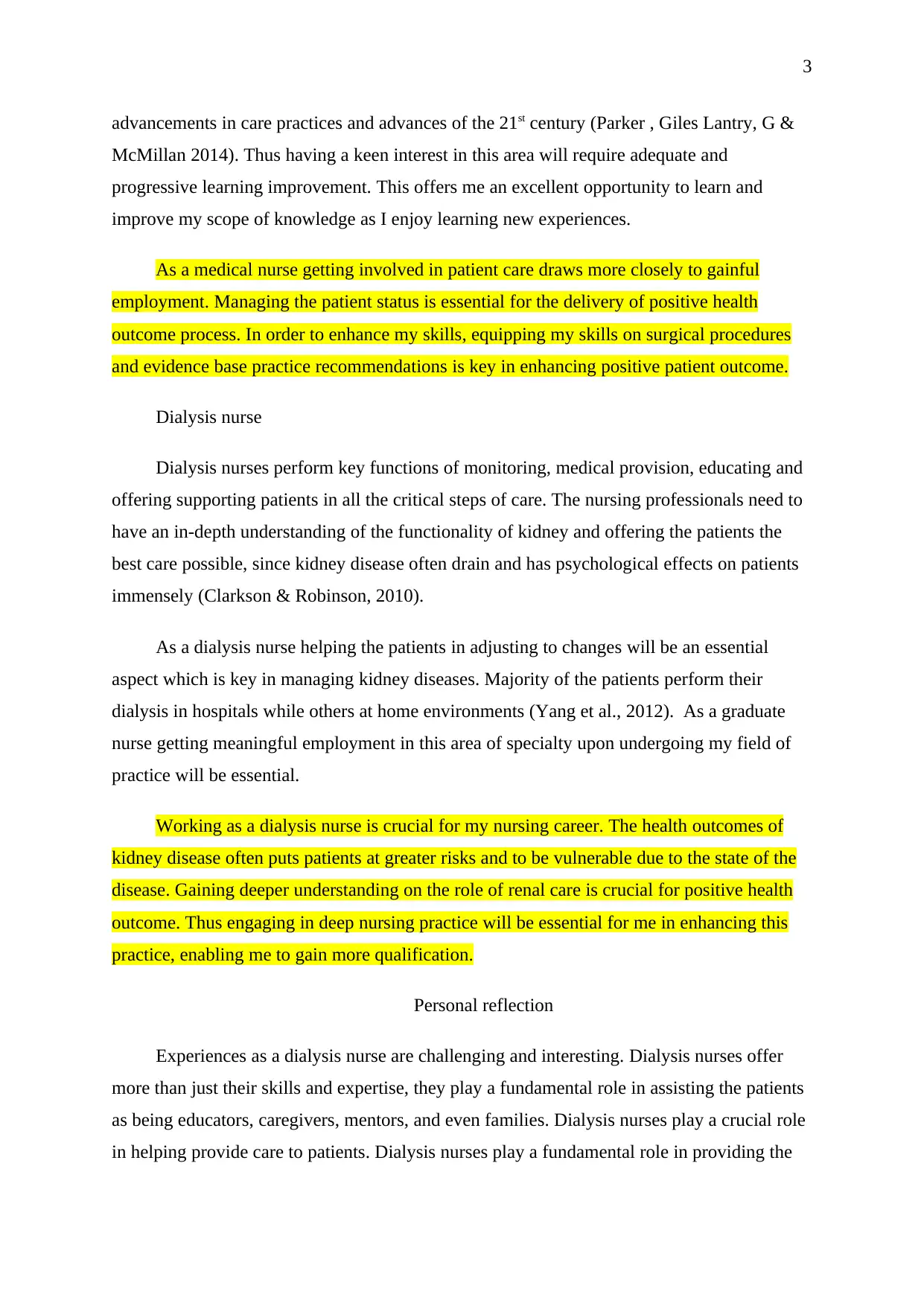
3
advancements in care practices and advances of the 21st century (Parker , Giles Lantry, G &
McMillan 2014). Thus having a keen interest in this area will require adequate and
progressive learning improvement. This offers me an excellent opportunity to learn and
improve my scope of knowledge as I enjoy learning new experiences.
As a medical nurse getting involved in patient care draws more closely to gainful
employment. Managing the patient status is essential for the delivery of positive health
outcome process. In order to enhance my skills, equipping my skills on surgical procedures
and evidence base practice recommendations is key in enhancing positive patient outcome.
Dialysis nurse
Dialysis nurses perform key functions of monitoring, medical provision, educating and
offering supporting patients in all the critical steps of care. The nursing professionals need to
have an in-depth understanding of the functionality of kidney and offering the patients the
best care possible, since kidney disease often drain and has psychological effects on patients
immensely (Clarkson & Robinson, 2010).
As a dialysis nurse helping the patients in adjusting to changes will be an essential
aspect which is key in managing kidney diseases. Majority of the patients perform their
dialysis in hospitals while others at home environments (Yang et al., 2012). As a graduate
nurse getting meaningful employment in this area of specialty upon undergoing my field of
practice will be essential.
Working as a dialysis nurse is crucial for my nursing career. The health outcomes of
kidney disease often puts patients at greater risks and to be vulnerable due to the state of the
disease. Gaining deeper understanding on the role of renal care is crucial for positive health
outcome. Thus engaging in deep nursing practice will be essential for me in enhancing this
practice, enabling me to gain more qualification.
Personal reflection
Experiences as a dialysis nurse are challenging and interesting. Dialysis nurses offer
more than just their skills and expertise, they play a fundamental role in assisting the patients
as being educators, caregivers, mentors, and even families. Dialysis nurses play a crucial role
in helping provide care to patients. Dialysis nurses play a fundamental role in providing the
advancements in care practices and advances of the 21st century (Parker , Giles Lantry, G &
McMillan 2014). Thus having a keen interest in this area will require adequate and
progressive learning improvement. This offers me an excellent opportunity to learn and
improve my scope of knowledge as I enjoy learning new experiences.
As a medical nurse getting involved in patient care draws more closely to gainful
employment. Managing the patient status is essential for the delivery of positive health
outcome process. In order to enhance my skills, equipping my skills on surgical procedures
and evidence base practice recommendations is key in enhancing positive patient outcome.
Dialysis nurse
Dialysis nurses perform key functions of monitoring, medical provision, educating and
offering supporting patients in all the critical steps of care. The nursing professionals need to
have an in-depth understanding of the functionality of kidney and offering the patients the
best care possible, since kidney disease often drain and has psychological effects on patients
immensely (Clarkson & Robinson, 2010).
As a dialysis nurse helping the patients in adjusting to changes will be an essential
aspect which is key in managing kidney diseases. Majority of the patients perform their
dialysis in hospitals while others at home environments (Yang et al., 2012). As a graduate
nurse getting meaningful employment in this area of specialty upon undergoing my field of
practice will be essential.
Working as a dialysis nurse is crucial for my nursing career. The health outcomes of
kidney disease often puts patients at greater risks and to be vulnerable due to the state of the
disease. Gaining deeper understanding on the role of renal care is crucial for positive health
outcome. Thus engaging in deep nursing practice will be essential for me in enhancing this
practice, enabling me to gain more qualification.
Personal reflection
Experiences as a dialysis nurse are challenging and interesting. Dialysis nurses offer
more than just their skills and expertise, they play a fundamental role in assisting the patients
as being educators, caregivers, mentors, and even families. Dialysis nurses play a crucial role
in helping provide care to patients. Dialysis nurses play a fundamental role in providing the
⊘ This is a preview!⊘
Do you want full access?
Subscribe today to unlock all pages.

Trusted by 1+ million students worldwide
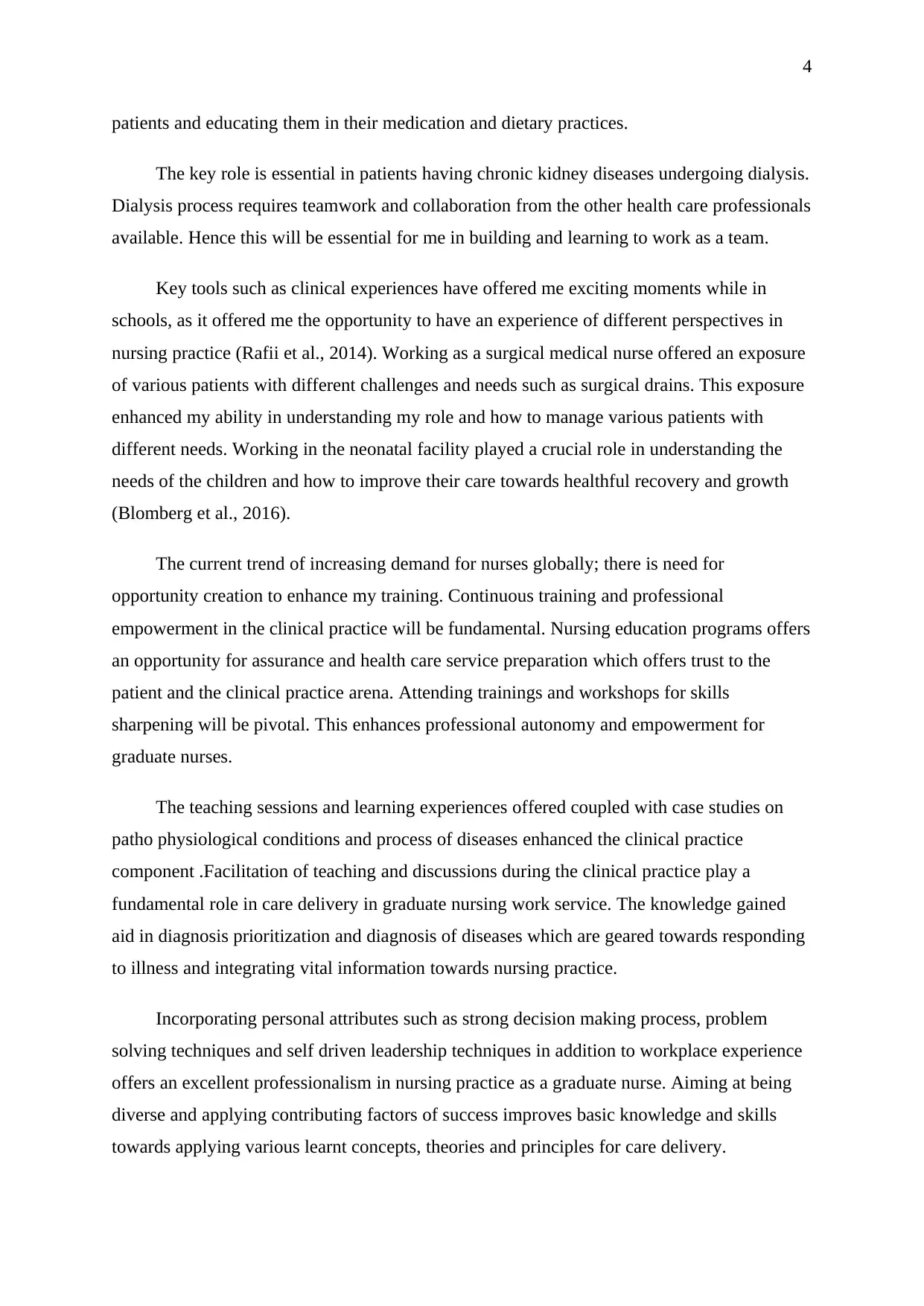
4
patients and educating them in their medication and dietary practices.
The key role is essential in patients having chronic kidney diseases undergoing dialysis.
Dialysis process requires teamwork and collaboration from the other health care professionals
available. Hence this will be essential for me in building and learning to work as a team.
Key tools such as clinical experiences have offered me exciting moments while in
schools, as it offered me the opportunity to have an experience of different perspectives in
nursing practice (Rafii et al., 2014). Working as a surgical medical nurse offered an exposure
of various patients with different challenges and needs such as surgical drains. This exposure
enhanced my ability in understanding my role and how to manage various patients with
different needs. Working in the neonatal facility played a crucial role in understanding the
needs of the children and how to improve their care towards healthful recovery and growth
(Blomberg et al., 2016).
The current trend of increasing demand for nurses globally; there is need for
opportunity creation to enhance my training. Continuous training and professional
empowerment in the clinical practice will be fundamental. Nursing education programs offers
an opportunity for assurance and health care service preparation which offers trust to the
patient and the clinical practice arena. Attending trainings and workshops for skills
sharpening will be pivotal. This enhances professional autonomy and empowerment for
graduate nurses.
The teaching sessions and learning experiences offered coupled with case studies on
patho physiological conditions and process of diseases enhanced the clinical practice
component .Facilitation of teaching and discussions during the clinical practice play a
fundamental role in care delivery in graduate nursing work service. The knowledge gained
aid in diagnosis prioritization and diagnosis of diseases which are geared towards responding
to illness and integrating vital information towards nursing practice.
Incorporating personal attributes such as strong decision making process, problem
solving techniques and self driven leadership techniques in addition to workplace experience
offers an excellent professionalism in nursing practice as a graduate nurse. Aiming at being
diverse and applying contributing factors of success improves basic knowledge and skills
towards applying various learnt concepts, theories and principles for care delivery.
patients and educating them in their medication and dietary practices.
The key role is essential in patients having chronic kidney diseases undergoing dialysis.
Dialysis process requires teamwork and collaboration from the other health care professionals
available. Hence this will be essential for me in building and learning to work as a team.
Key tools such as clinical experiences have offered me exciting moments while in
schools, as it offered me the opportunity to have an experience of different perspectives in
nursing practice (Rafii et al., 2014). Working as a surgical medical nurse offered an exposure
of various patients with different challenges and needs such as surgical drains. This exposure
enhanced my ability in understanding my role and how to manage various patients with
different needs. Working in the neonatal facility played a crucial role in understanding the
needs of the children and how to improve their care towards healthful recovery and growth
(Blomberg et al., 2016).
The current trend of increasing demand for nurses globally; there is need for
opportunity creation to enhance my training. Continuous training and professional
empowerment in the clinical practice will be fundamental. Nursing education programs offers
an opportunity for assurance and health care service preparation which offers trust to the
patient and the clinical practice arena. Attending trainings and workshops for skills
sharpening will be pivotal. This enhances professional autonomy and empowerment for
graduate nurses.
The teaching sessions and learning experiences offered coupled with case studies on
patho physiological conditions and process of diseases enhanced the clinical practice
component .Facilitation of teaching and discussions during the clinical practice play a
fundamental role in care delivery in graduate nursing work service. The knowledge gained
aid in diagnosis prioritization and diagnosis of diseases which are geared towards responding
to illness and integrating vital information towards nursing practice.
Incorporating personal attributes such as strong decision making process, problem
solving techniques and self driven leadership techniques in addition to workplace experience
offers an excellent professionalism in nursing practice as a graduate nurse. Aiming at being
diverse and applying contributing factors of success improves basic knowledge and skills
towards applying various learnt concepts, theories and principles for care delivery.
Paraphrase This Document
Need a fresh take? Get an instant paraphrase of this document with our AI Paraphraser
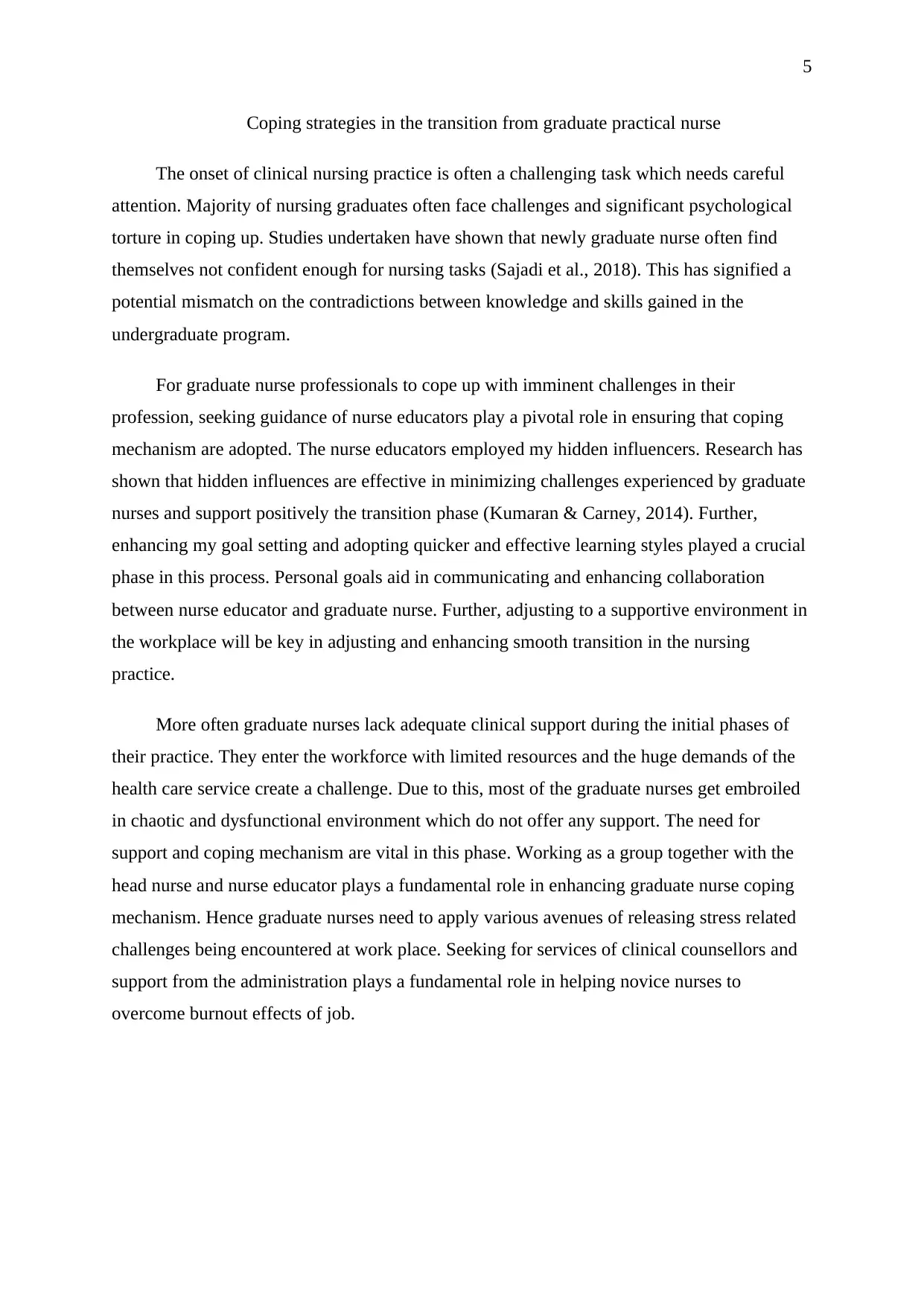
5
Coping strategies in the transition from graduate practical nurse
The onset of clinical nursing practice is often a challenging task which needs careful
attention. Majority of nursing graduates often face challenges and significant psychological
torture in coping up. Studies undertaken have shown that newly graduate nurse often find
themselves not confident enough for nursing tasks (Sajadi et al., 2018). This has signified a
potential mismatch on the contradictions between knowledge and skills gained in the
undergraduate program.
For graduate nurse professionals to cope up with imminent challenges in their
profession, seeking guidance of nurse educators play a pivotal role in ensuring that coping
mechanism are adopted. The nurse educators employed my hidden influencers. Research has
shown that hidden influences are effective in minimizing challenges experienced by graduate
nurses and support positively the transition phase (Kumaran & Carney, 2014). Further,
enhancing my goal setting and adopting quicker and effective learning styles played a crucial
phase in this process. Personal goals aid in communicating and enhancing collaboration
between nurse educator and graduate nurse. Further, adjusting to a supportive environment in
the workplace will be key in adjusting and enhancing smooth transition in the nursing
practice.
More often graduate nurses lack adequate clinical support during the initial phases of
their practice. They enter the workforce with limited resources and the huge demands of the
health care service create a challenge. Due to this, most of the graduate nurses get embroiled
in chaotic and dysfunctional environment which do not offer any support. The need for
support and coping mechanism are vital in this phase. Working as a group together with the
head nurse and nurse educator plays a fundamental role in enhancing graduate nurse coping
mechanism. Hence graduate nurses need to apply various avenues of releasing stress related
challenges being encountered at work place. Seeking for services of clinical counsellors and
support from the administration plays a fundamental role in helping novice nurses to
overcome burnout effects of job.
Coping strategies in the transition from graduate practical nurse
The onset of clinical nursing practice is often a challenging task which needs careful
attention. Majority of nursing graduates often face challenges and significant psychological
torture in coping up. Studies undertaken have shown that newly graduate nurse often find
themselves not confident enough for nursing tasks (Sajadi et al., 2018). This has signified a
potential mismatch on the contradictions between knowledge and skills gained in the
undergraduate program.
For graduate nurse professionals to cope up with imminent challenges in their
profession, seeking guidance of nurse educators play a pivotal role in ensuring that coping
mechanism are adopted. The nurse educators employed my hidden influencers. Research has
shown that hidden influences are effective in minimizing challenges experienced by graduate
nurses and support positively the transition phase (Kumaran & Carney, 2014). Further,
enhancing my goal setting and adopting quicker and effective learning styles played a crucial
phase in this process. Personal goals aid in communicating and enhancing collaboration
between nurse educator and graduate nurse. Further, adjusting to a supportive environment in
the workplace will be key in adjusting and enhancing smooth transition in the nursing
practice.
More often graduate nurses lack adequate clinical support during the initial phases of
their practice. They enter the workforce with limited resources and the huge demands of the
health care service create a challenge. Due to this, most of the graduate nurses get embroiled
in chaotic and dysfunctional environment which do not offer any support. The need for
support and coping mechanism are vital in this phase. Working as a group together with the
head nurse and nurse educator plays a fundamental role in enhancing graduate nurse coping
mechanism. Hence graduate nurses need to apply various avenues of releasing stress related
challenges being encountered at work place. Seeking for services of clinical counsellors and
support from the administration plays a fundamental role in helping novice nurses to
overcome burnout effects of job.
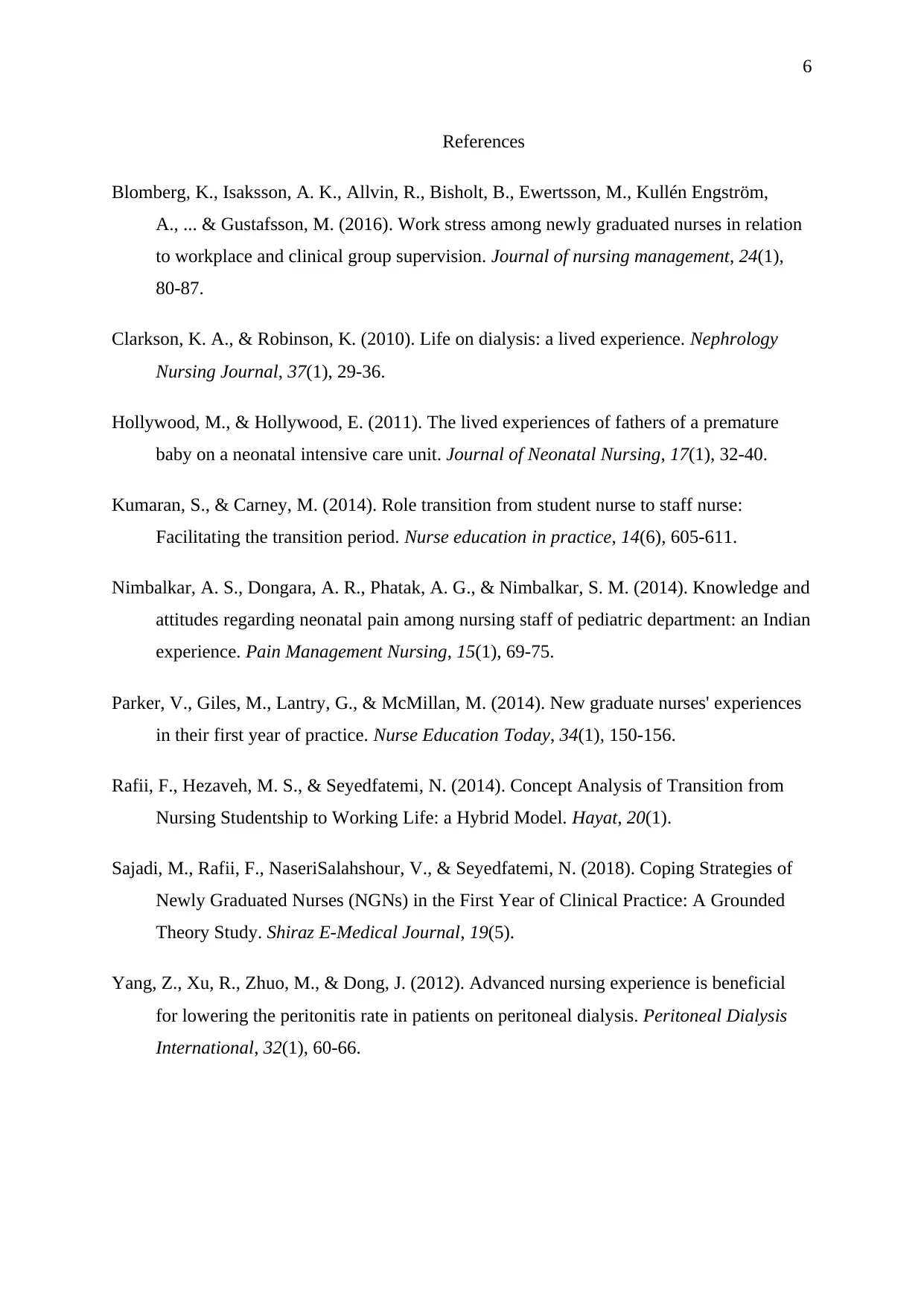
6
References
Blomberg, K., Isaksson, A. K., Allvin, R., Bisholt, B., Ewertsson, M., Kullén Engström,
A., ... & Gustafsson, M. (2016). Work stress among newly graduated nurses in relation
to workplace and clinical group supervision. Journal of nursing management, 24(1),
80-87.
Clarkson, K. A., & Robinson, K. (2010). Life on dialysis: a lived experience. Nephrology
Nursing Journal, 37(1), 29-36.
Hollywood, M., & Hollywood, E. (2011). The lived experiences of fathers of a premature
baby on a neonatal intensive care unit. Journal of Neonatal Nursing, 17(1), 32-40.
Kumaran, S., & Carney, M. (2014). Role transition from student nurse to staff nurse:
Facilitating the transition period. Nurse education in practice, 14(6), 605-611.
Nimbalkar, A. S., Dongara, A. R., Phatak, A. G., & Nimbalkar, S. M. (2014). Knowledge and
attitudes regarding neonatal pain among nursing staff of pediatric department: an Indian
experience. Pain Management Nursing, 15(1), 69-75.
Parker, V., Giles, M., Lantry, G., & McMillan, M. (2014). New graduate nurses' experiences
in their first year of practice. Nurse Education Today, 34(1), 150-156.
Rafii, F., Hezaveh, M. S., & Seyedfatemi, N. (2014). Concept Analysis of Transition from
Nursing Studentship to Working Life: a Hybrid Model. Hayat, 20(1).
Sajadi, M., Rafii, F., NaseriSalahshour, V., & Seyedfatemi, N. (2018). Coping Strategies of
Newly Graduated Nurses (NGNs) in the First Year of Clinical Practice: A Grounded
Theory Study. Shiraz E-Medical Journal, 19(5).
Yang, Z., Xu, R., Zhuo, M., & Dong, J. (2012). Advanced nursing experience is beneficial
for lowering the peritonitis rate in patients on peritoneal dialysis. Peritoneal Dialysis
International, 32(1), 60-66.
References
Blomberg, K., Isaksson, A. K., Allvin, R., Bisholt, B., Ewertsson, M., Kullén Engström,
A., ... & Gustafsson, M. (2016). Work stress among newly graduated nurses in relation
to workplace and clinical group supervision. Journal of nursing management, 24(1),
80-87.
Clarkson, K. A., & Robinson, K. (2010). Life on dialysis: a lived experience. Nephrology
Nursing Journal, 37(1), 29-36.
Hollywood, M., & Hollywood, E. (2011). The lived experiences of fathers of a premature
baby on a neonatal intensive care unit. Journal of Neonatal Nursing, 17(1), 32-40.
Kumaran, S., & Carney, M. (2014). Role transition from student nurse to staff nurse:
Facilitating the transition period. Nurse education in practice, 14(6), 605-611.
Nimbalkar, A. S., Dongara, A. R., Phatak, A. G., & Nimbalkar, S. M. (2014). Knowledge and
attitudes regarding neonatal pain among nursing staff of pediatric department: an Indian
experience. Pain Management Nursing, 15(1), 69-75.
Parker, V., Giles, M., Lantry, G., & McMillan, M. (2014). New graduate nurses' experiences
in their first year of practice. Nurse Education Today, 34(1), 150-156.
Rafii, F., Hezaveh, M. S., & Seyedfatemi, N. (2014). Concept Analysis of Transition from
Nursing Studentship to Working Life: a Hybrid Model. Hayat, 20(1).
Sajadi, M., Rafii, F., NaseriSalahshour, V., & Seyedfatemi, N. (2018). Coping Strategies of
Newly Graduated Nurses (NGNs) in the First Year of Clinical Practice: A Grounded
Theory Study. Shiraz E-Medical Journal, 19(5).
Yang, Z., Xu, R., Zhuo, M., & Dong, J. (2012). Advanced nursing experience is beneficial
for lowering the peritonitis rate in patients on peritoneal dialysis. Peritoneal Dialysis
International, 32(1), 60-66.
⊘ This is a preview!⊘
Do you want full access?
Subscribe today to unlock all pages.

Trusted by 1+ million students worldwide
1 out of 6
Related Documents
Your All-in-One AI-Powered Toolkit for Academic Success.
+13062052269
info@desklib.com
Available 24*7 on WhatsApp / Email
![[object Object]](/_next/static/media/star-bottom.7253800d.svg)
Unlock your academic potential
Copyright © 2020–2025 A2Z Services. All Rights Reserved. Developed and managed by ZUCOL.





